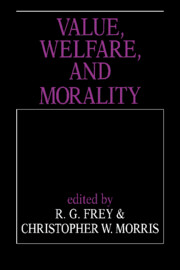Book contents
- Frontmatter
- Contents
- List of contributors
- Preface
- 1 Value, welfare, and morality
- 2 The land of lost content
- 3 Putting rationality in its place
- 4 Can a Humean be moderate?
- 5 Welfare, preference, and rationality
- 6 Preference
- 7 Reason and needs
- 8 Desired desires
- 9 On the winding road from good to right
- 10 Value, reasons, and the sense of justice
- 11 Agent-relativity of value, deontic restraints, and self-ownership
- 12 Agent-relativity – the very idea
- 13 The separateness of persons, distributive norms, and moral theory
- 14 Harmful goods, harmless bads
5 - Welfare, preference, and rationality
Published online by Cambridge University Press: 07 December 2009
- Frontmatter
- Contents
- List of contributors
- Preface
- 1 Value, welfare, and morality
- 2 The land of lost content
- 3 Putting rationality in its place
- 4 Can a Humean be moderate?
- 5 Welfare, preference, and rationality
- 6 Preference
- 7 Reason and needs
- 8 Desired desires
- 9 On the winding road from good to right
- 10 Value, reasons, and the sense of justice
- 11 Agent-relativity of value, deontic restraints, and self-ownership
- 12 Agent-relativity – the very idea
- 13 The separateness of persons, distributive norms, and moral theory
- 14 Harmful goods, harmless bads
Summary
My title situates preference in the position it has come to occupy during this century: as the putative link between individual welfare on the one hand and practical rationality on the other. This mediating role, connecting one of the principal evaluative notions in ethics and the central normative notion in rational choice theory, is an impressive accomplishment for what seems at first glance a rather homely little item in our folk psychology. It has managed to elevate itself to this status, at least within the empiricist tradition, by reaching separate alliances with its two companions. Empiricists have tended to be subjectivists about welfare and instrumentalists about rationality. On the side of welfare, the eclipse of hedonism left the preference theory alone in the field as a plausible subjective account of the nature of well-being. Thus the Welfare–Preference Connection:
WP: An individual's welfare consists in the satisfaction of her preferences.
On the side of rationality, meanwhile, instrumentalism entailed that reasons for action can be given only by items internal to the agent's motivational set. Thus the Preference–Rationality Connection:
PR: Rationality requires the individual agent to maximize the satisfaction of her preferences.
Since each of these connections is well established in its own sphere, the mediating role for preference seems secure. At the same time, however, something has clearly gone wrong. When we conjoin these two theses, the result is the Welfare–Rationality Connection:
WR: Rationality requires the individual agent to maximize her own welfare.
- Type
- Chapter
- Information
- Value, Welfare, and Morality , pp. 74 - 92Publisher: Cambridge University PressPrint publication year: 1993



